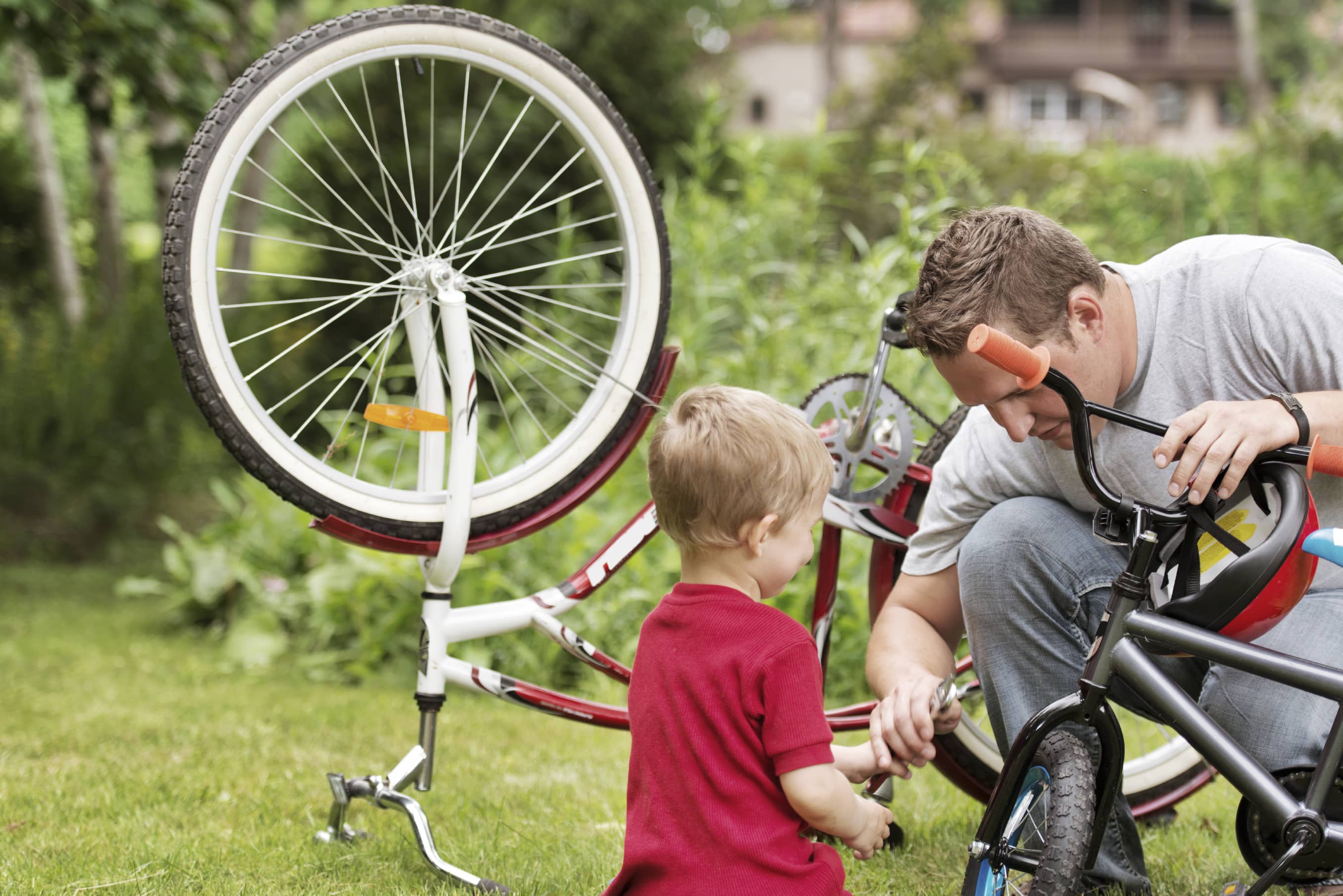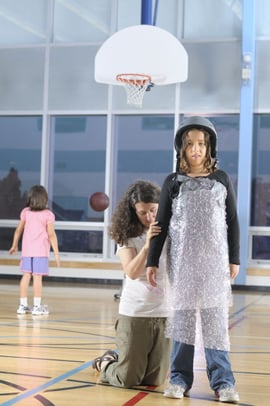"You cannot escape the responsibility of tomorrow by evading it today."
~Abraham Lincoln
All parents want to raise responsible, self-reliant children—but getting there doesn't happen overnight. It takes years of nurturing to prepare our kids for a life of independence. Not only do we need to actively teach our children responsibility, but we also need to model the behaviors we want to see. And it's also important to avoid making critical parenting mistakes that could undermine our goal of raising independent kids.
CONTENTS:
Five Common Parenting Mistakes
Parenting Mistake #1: Inconsistency
Why Consistency Matters in Parenting
Keys to Increase Consistency
Parenting Mistake #2: Overdoing
Fostering Independence and Self-Reliance
Parenting Mistake #3: Overprotecting
Why Empowerment Matters
Parenting Mistake #4: Criticizing and Shaming
Why Encouragement Matters
Parenting Mistake #5: Controlling
Balance Love and Firmness

Teaching Children Responsibility
To learn how to teach children responsibility, it's crucial to look at our mistakes so we can self-correct as parents. It's also vital to realize children are not small adults. Children and teenagers cannot assume responsibility and exercise rational judgment in the same way adults do. After all, their brains are not fully developed until age 25. However, the spurts of brain development in children are also not an excuse for misbehavior. Likewise, childhood vulnerabilities shouldn't mean we swoop in and overprotect our kids, overdo things on their behalf, or seek to control their lives.
Easier said than done, though, isn’t it?
No matter how good our intentions are, sometimes our parenting choices (or just the challenges of everyday life) can interfere with our children’s budding sense of responsibility. It requires emotionally intelligent parenting to navigate the relentless—and joyous—job of parenting.
Knowing that every parent tries their best, let’s compassionately take a look at five common parenting mistakes that can hinder a child’s self-reliance and sense of responsibility. After all, our goal is to nurture our children's independence, not squash it, so we’ll also provide ways to promote self-responsibility at the end of each section.
Five Common Parenting Mistakes
 Parenting Mistake #1: Inconsistency
Parenting Mistake #1: Inconsistency
All of us are inconsistent from time to time. When it comes to parenting, inconsistency is problematic when your responses to your child’s actions change from day to day, and they don’t understand why.
Inconsistency often starts when you let a misbehavior slide a few times. You know the justifications: you’re preoccupied with dinner or a timely project, and it’s inconvenient to correct the behavior. Maybe the misbehavior happens in public and you don’t want to make a scene. Or my favorite: you’re hoping your child will outgrow the misconduct—nope, the behavior is getting patterned.
But then, your child misbehaves again, and you snap, enforcing an overly harsh punishment because you’re stressed or upset. You might even feel guilty about your knee-jerk reaction and possibly indulge your child later. These contradictory reactions will most likely confuse your child.
 When you ignore a behavior one minute and explode over the same behavior the next, children can develop uncertainty and anxiousness, which inhibits their innate curiosity and need for exploration. The line of certainty keeps moving, so the child doesn’t know what is expected. They can even come to believe that things happen on your whim since there’s no way to predict how you will respond.
When you ignore a behavior one minute and explode over the same behavior the next, children can develop uncertainty and anxiousness, which inhibits their innate curiosity and need for exploration. The line of certainty keeps moving, so the child doesn’t know what is expected. They can even come to believe that things happen on your whim since there’s no way to predict how you will respond.
When you finally do react, often the punishment will feel disproportionate to your child or teen (since you’ve let the misbehavior slide in the past), so your child rebels against the perceived injustice. And now, the misbehavior can snowball, becoming a way for the child to get attention.
Rather than developing a sense of confidence that leads naturally to exploration and self-reliance, parental inconsistency can lead some children to people-please. Or if their independence is continually thwarted, power struggles tend to escalate, or a child can become discouraged. I’m sure you’d agree that these are undesirable outcomes.
Why Consistency Matters in Parenting
Children need a clear structure and stability from their parents. Consistency provides predictability and promotes a sense of safety, the brain’s number one priority. It’s up to you to define appropriate and healthy boundaries for their behavior and consistently reinforce these boundaries. Their job is to test the boundaries; it helps them feel safe to know the limit is solid.
As parents, we need to establish a secure attachment for children to have a solid base to feel safe. From this security, they are free to circle back to us for comfort, support, empathy, and reassurance; then, once recharged, they can go out and explore the world once again. This yin and yang cycle happens with younger children frequently, and the spaces of independence extend longer and longer as a child grows older. When both autonomy and closeness are nurtured, healthy self-esteem sprouts.
Keys for Increasing Consistency
I get it! I raised three children and worked full-time; it's a huge challenge to be consistent, especially when your to-do list is a mile long and you're tired—or even exhausted. The first step in raising children with consistency is to make a conscious decision to make it a priority. Next, pinpoint the times of days that you are most lax with follow-through. Put rituals in place that support you and your child during these times.
For instance, when I was tired at night (a time of leniency for me), we read books together or played quiet games like I-Spy. When I had more energy, we planned more vigorous activities. Some days, my mompreneurial lifestyle allowed me to take naps before my children came home from school so that I could be fresh and fully present.
 Next, identify the key behaviors, i.e., respect, that are nonnegotiable and require staunch follow-through. You might decide that some behaviors are negotiable, like being calm and quiet in the house. Then get in touch with what values you want to cultivate. If you want to raise critical-thinking children, then how you respond will look different than if obedience is a higher priority. If you want teens who will resist peer pressure and unhealthy experimentation, then you must let them speak up and even challenge you at times in the safety net of your love and support.
Next, identify the key behaviors, i.e., respect, that are nonnegotiable and require staunch follow-through. You might decide that some behaviors are negotiable, like being calm and quiet in the house. Then get in touch with what values you want to cultivate. If you want to raise critical-thinking children, then how you respond will look different than if obedience is a higher priority. If you want teens who will resist peer pressure and unhealthy experimentation, then you must let them speak up and even challenge you at times in the safety net of your love and support.
Once you feel like you’ve reached a good balance and know your top priorities for consistency, tackling your tendency to let things go won’t seem overwhelming. Now, stick to these decisions consistently.
Related reading: “Visionary Parenting Is the Key to Capable and Happy Children.”
 Parenting Mistake #1: Overdoing
Parenting Mistake #1: Overdoing
How many times has your child huffed, "I can do it, Mom!" (or Dad), only for you to swoop in and finish the task for them anyway? It can be challenging to let go of the gratifying parental feeling of being needed.
However, whenever you do for your child what they can do for themselves, you deny them the opportunity to develop skills and confidence. You might think you are being helpful or saving time. In reality, you’re sending a double message that might cause your child to doubt themselves, question their abilities, and squelch their internal motivation.
Fostering Independence and Self-Reliance
Independence is like a muscle: it needs to be exercised! When your child wants to assert their independence but is denied the opportunity, the muscle weakens. Lack of use can undermine their development; passivity can replace an eagerness to learn. A child learns responsibility by being responsible for small and big tasks and activities appropriate to their age.
When we overdo it for a child, our behavior can distort their view of the world, their place in it, and what is expected. Then the child can develop the mistaken belief that they are inadequate or even develop a sense of entitlement. After all, if you always take care of everything for them, what's the purpose of acting responsibly?
Allow your children to do age-appropriate tasks for themselves. This liberty allows them the opportunity to grow into responsible and self-reliant individuals.
Children as young as two and three years old can handle certain tasks by themselves, such as getting dressed or putting dirty dishes in the dishwasher. A preschooler can pick up their toys and make their bed (albeit a little imperfectly); a middle-schooler can be responsible for completing homework and family chores; a teen can balance the family checkbook, grocery shop, and cook meals occasionally. I know of one family whose son loved cooking so much that he made meals 3-4 times a week for the family—and later became a chef!
Many children actually want to help—let them! Even if it requires a little more effort on your part initially, you get a helper around the house, and they get a chance to exercise their skills and independence.
Related reading: "Positive Parenting: 2 Parenting Strategies for Greater Patience."
 Parenting Mistake #1: Overprotecting
Parenting Mistake #1: Overprotecting
Overprotective “helicopter parents” are often guided by a misplaced sense of duty to their children. While you may be well-intentioned and think you are protecting your child by preventing them from playing contact sports or pulling strings at school on their behalf, what your child often hears is that you do not believe in their abilities.
 Protecting them from life’s little hurts only makes them more fragile later. “Saving” your children from making mistakes or rescuing them from potential pain prevents them from learning valuable life lessons. Each lesson prepares them better for the next experience.
Protecting them from life’s little hurts only makes them more fragile later. “Saving” your children from making mistakes or rescuing them from potential pain prevents them from learning valuable life lessons. Each lesson prepares them better for the next experience.
Why Empowerment Matters
Think about how a toddler learns to walk. They don’t fear the fall; they eagerly get up again and again after stumbling, as if the failure is play—no hesitation, only eagerness to grow and learn.
Children who are encouraged to “fail forward” (using failures as stepping stones for growth) build a strong will and understand that their efforts make a difference in every outcome. Making mistakes, handling frustration, and learning to cope after letdowns and hurts stretch children a little bit at a time. These experiences teach children the growth mindset, the value of perseverance, and intrinsic motivation.
Allow Children to Explore
Next time you feel the urge to overprotect your child, remind yourself of the many benefits your child gains through experience. When you’re tempted to do something that a child can do for themselves, step back and breathe.
When you need to be involved, but your child has outgrown your help because they’ve mastered a skill, teach your child a new skill. Challenge them to stretch, make mistakes, and learn! Encourage your children to explore the world around them and teach them how to make wise assessments of their actions and take reasonable risks to stay safe.

 Parenting Mistake #4: Criticizing or Shaming
Parenting Mistake #4: Criticizing or Shaming
If you grew up in a household where sarcasm or criticism replaced encouragement, you might confuse criticizing or shaming your children with dishing out "tough love." Parents can innocently believe their actions help their children when they're actually chipping away at their tender self-esteem.
Here are some examples that might sound familiar:
- your dad criticized the way you held your bat at your softball games
- no matter how you excelled in academics, your parents said you could do better
- your aunt told you to stand up straight every time she saw you
- when you happily danced downstairs in an outfit that made you feel happy, your mom ordered you to go upstairs and change your outfit because of the way it made you look
- your dad told you to buck up and stop being such a baby
Our goal is not to toughen our kids; our goal as parents is to prepare them to succeed in life. Our job as parents is to help them grow up to handle whatever the world throws at them confidently. Criticism may toughen a child, but it also tears down their budding self-esteem.

Why Encouragement Matters
While we may mistakenly think we are helping our children by criticizing or advising them, it often backfires and causes them to mistrust themselves. They can also misinterpret our “constructive criticism” to mean that we don't trust them.
If we want to raise independent, responsible children, we need to teach them that their emotions, opinions, and actions matter. It helps to spend more time listening rather than reacting to what they say and do. Although it can be tempting to dole out advice, children and teens can interpret even the most well-intentioned criticism as a rejection of who they are as budding people. Over the years, I've coached numerous children—as young as seven—who told me that they didn't think their parents liked them. (And their parents were surprised by this revelation.)
When you show your children that you trust them through active and empathetic listening, they feel heard and validated. Believing in your child is often enough to motivate them to do the right thing on their own. As your child matures, you’ll need to let go and trust that you've taught them the skills they need to come to the right conclusion on their own. Many times, it’s not until we stop dishing out unsolicited advice that our children ask for it.
 Parenting Mistake #5: Controlling
Parenting Mistake #5: Controlling
We all grew up differently: some with permissive parenting, others with strict or authoritarian. And for some, absentee parenting was the norm. However, if you’re a parent today, you know just how challenging being a parent can be.
One parenting style that studies show is detrimental to a child’s development is authoritarian parenting. Authoritarian parenting can be summarized by the phrase, “it’s my way or the highway.”
While authoritative parenting sets firm and clear standards, this style of parenting is usually heavy on discipline. It offers children few opportunities to make choices, think for themselves, or develop their own personal preferences and values. Instead, children are expected to live up to their parents’ high standards, and when they cannot, they are often punished or shamed. Authoritarian parenting generates a culture of fear rather than love.

Balance Love with Firmness
How you parent matters!
Parenting is the primary influence in a child's life. Each day, our child waxes toward adulthood. Every moment is an opportunity to provide safety and security balanced with autonomy and independence.
For independence and a sense of responsibility to grow, children need to know that they are safe, first and foremost. Safety shouldn’t be dependent on a child’s behavior or the choices they make. Unconditional love builds a safety net that enables children’s sure-footed exploration.
However, having the freedom to think for themselves or even challenge authority figures doesn’t give children a license to be disrespectful. It just means that your child learns from their mistakes in a supportive environment where parental responses and disciplines are reasonable, relevant, and meaningful to the child. By calmly discussing issues with children and teens, resolutions and increased closeness can be achieved.
 Children of all ages need to be allowed to speak for themselves and assert their physical and emotional boundaries with you and other adults in their lives. Respect is a two-way street.
Children of all ages need to be allowed to speak for themselves and assert their physical and emotional boundaries with you and other adults in their lives. Respect is a two-way street.
Parenting doesn’t come with an instruction manual; mistakes are inevitable, even if parents receive a four-year degree from a parenting university. It takes courage to let go of control and learn a new way. Begin with exploring what you are trying to teach your child. Is it respect? Are you trying to keep them safe? Or are you trying to toughen them? Begin here. And then look for a more loving way to teach the same value or lesson.
Parenting Is Tough. You're Not Alone.
For assistance navigating even the most challenging parenting situations, turn to HeartPrints Parenting.
Heartmanity’s unique approach of conscious parenting will teach you how to use your heart as a guide for nurturing your children into responsible, independent individuals with a potent sense of intrinsic motivation and self-reliance.









